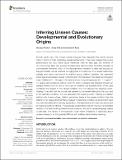Inferring unseen causes : developmental and evolutionary origins
Abstract
Human adults can infer unseen causes because they represent the events around them in terms of their underlying causal mechanisms. It has been argued that young preschoolers can also make causal inferences from an early age, but whether or not nonhuman apes can go beyond associative learning when exploiting causality is controversial. However, much of the developmental research to date has focused on fully-perceivable causal relations or highlighted the existence of a causal relationship verbally and these were found to scaffold young children’s abilities. We examined inferences about unseen causes in children and chimpanzees in the absence of linguistic cues. Children (N=129, aged 3-6 years) and zoo-living chimpanzees (N=11, aged 7-41 years) were presented with an event in which a reward was dropped through an opaque forked-tube into one of two cups. An auditory cue signaled which of the cups contained the reward. In the causal condition, the cue followed the dropping event, making it plausible that the sound was caused by the reward falling into the cup; and in the arbitrary condition, the cue preceded the dropping event, making the relation arbitrary. By 4-years of age, children performed better in the causal condition than the arbitrary one, suggesting that they engaged in reasoning. A follow-up experiment ruled out a simpler associative learning explanation. Chimpanzees and 3-year-olds performed at chance in both conditions. These groups’ performance did not improve in a simplified version of the task involving shaken boxes; however, the use of causal language helped 3-year-olds. The failure of chimpanzees could reflect limitations in reasoning about unseen causes or a more general difficulty with auditory discrimination learning.
Citation
Civelek , Z , Call , J & Seed , A 2020 , ' Inferring unseen causes : developmental and evolutionary origins ' , Frontiers in Psychology , vol. 11 , 872 . https://doi.org/10.3389/fpsyg.2020.00872
Publication
Frontiers in Psychology
Status
Peer reviewed
ISSN
1664-1078Type
Journal article
Description
This project has received funding from the European Research Council (ERC) under the European Union’s Horizon 2020 Research and Innovation Programme (Grant Agreement No. 639072).Collections
Items in the St Andrews Research Repository are protected by copyright, with all rights reserved, unless otherwise indicated.

